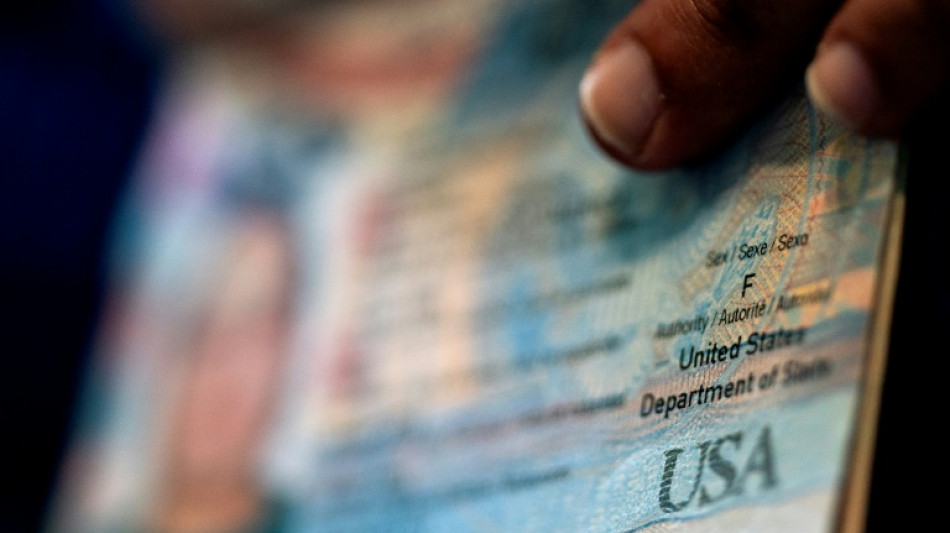
-
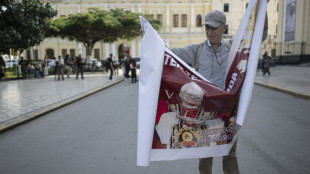 From Chicago to Chiclayo: Peruvian town hails adoptive son and pope
From Chicago to Chiclayo: Peruvian town hails adoptive son and pope
-
Ivorian women fight FGM with reconstructive surgery

-
 Pedersen wins opening stage of Giro d'Italia in Albania
Pedersen wins opening stage of Giro d'Italia in Albania
-
Stocks mixed despite hopes for US-China tariff talks
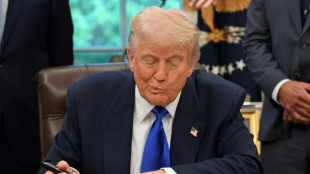
-
 US, Swiss agree to speed up tariff talks
US, Swiss agree to speed up tariff talks
-
Trump floats cutting China tariffs to 80% ahead of trade talks
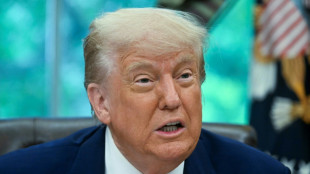
-
 Pedersen wins opening stage of Giro d'Italia
Pedersen wins opening stage of Giro d'Italia
-
Marc Marquez sets Le Mans lap record in French MotoGP practice

-
 Jungle music: Chimp drumming reveals building blocks of human rhythm
Jungle music: Chimp drumming reveals building blocks of human rhythm
-
Guardiola tells Man City stars to question their hunger after troubled season

-
 Putin, Xi, Steven Seagal and missiles: Russia's Red Square parade
Putin, Xi, Steven Seagal and missiles: Russia's Red Square parade
-
Trump suggests lower 80% China tariff ahead of Geneva trade talks
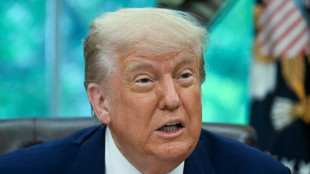
-
 Arteta wants Arsenal to use Liverpool guard of honour as title fuel
Arteta wants Arsenal to use Liverpool guard of honour as title fuel
-
Stocks lifted by hopes for US-China talks
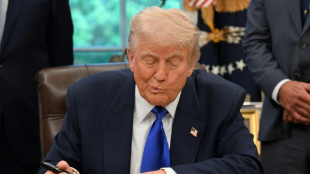
-
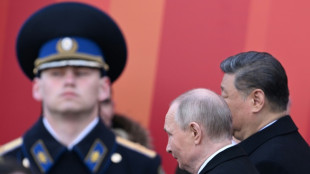 Putin hails troops in Ukraine as allies attend WWII parade
Putin hails troops in Ukraine as allies attend WWII parade
-
UK, northern European nations support Ukraine 30-day ceasefire: Norway PM
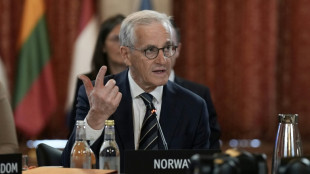
-
 Activists hold 'die-in' protest at Soviet monument in Warsaw
Activists hold 'die-in' protest at Soviet monument in Warsaw
-
Trump suggests lower China tariff, says 80% 'seems right!'
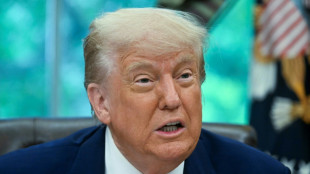
-
 Alonso confirms exit from Leverkusen at end of season
Alonso confirms exit from Leverkusen at end of season
-
Maresca ready for Chelsea's 'huge' Newcastle test

-
 Alcaraz, Sabalenka cruise to wins at the Italian Open
Alcaraz, Sabalenka cruise to wins at the Italian Open
-
Swiss seize window of opportunity on Trump tariffs

-
 Amorim admits Man Utd 'problems' despite reaching Europa League final
Amorim admits Man Utd 'problems' despite reaching Europa League final
-
New Pope Leo XIV has mixed record on abuse: campaigners

-
 Xabi Alonso confirms exit from Bayer Leverkusen at season's end
Xabi Alonso confirms exit from Bayer Leverkusen at season's end
-
From blockades to ballots: Serbian students confront government
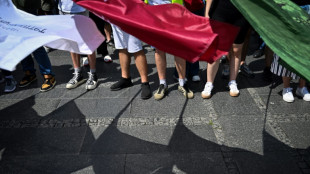
-
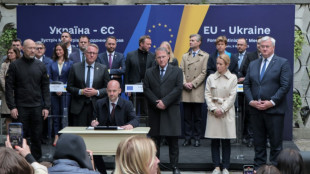 Kyiv's EU allies endorse tribunal to try Russian leaders
Kyiv's EU allies endorse tribunal to try Russian leaders
-
Two men found guilty of chopping down iconic UK tree

-
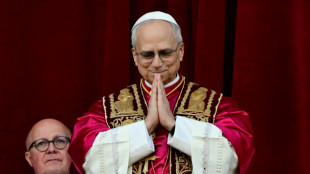 Tennis, Twitter and marinated fish: Things to know about Pope Leo
Tennis, Twitter and marinated fish: Things to know about Pope Leo
-
Liverpool's Salah voted Football Writers' Player of the Year

-
 Pakistan says India has brought neighbours 'closer to major conflict'
Pakistan says India has brought neighbours 'closer to major conflict'
-
Stocks lifted by hopes for US-China talks after UK deal
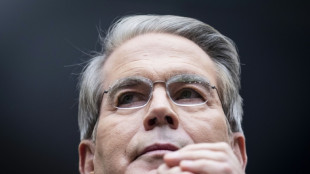
-
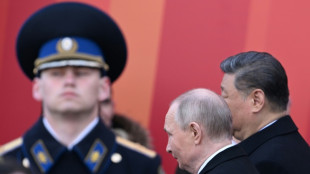 Putin hails troops fighting in Ukraine as foreign leaders attend parade
Putin hails troops fighting in Ukraine as foreign leaders attend parade
-
Howe urges Newcastle to fulfil Champions League expectation

-
 Weary border residents in Indian Kashmir struggle to survive
Weary border residents in Indian Kashmir struggle to survive
-
Leo XIV says Church must fight 'lack of faith' in first mass as pope
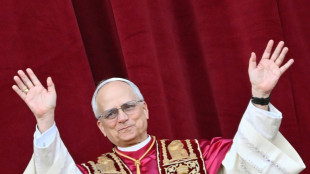
-
 Liverpool boss Slot fears replacing Alexander-Arnold will be a tough task
Liverpool boss Slot fears replacing Alexander-Arnold will be a tough task
-
British Airways owner unveils big Boeing, Airbus order

-
 IPL suspended for one week over India-Pakistan conflict
IPL suspended for one week over India-Pakistan conflict
-
Slot says all at Liverpool sad to see Alexander-Arnold go

-
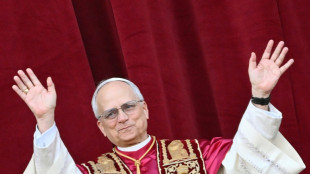 Leo XIV celebrates first mass as pope in Sistine Chapel
Leo XIV celebrates first mass as pope in Sistine Chapel
-
India says repulsed fresh Pakistan attacks as death toll climbs

-
 Japan's Panasonic targets 10,000 job cuts worldwide
Japan's Panasonic targets 10,000 job cuts worldwide
-
Putin evokes WWII victory to rally Russia behind Ukraine offensive

-
 China exports beat forecasts ahead of US tariff talks
China exports beat forecasts ahead of US tariff talks
-
Leo XIV, the 'Latin Yankee', to celebrate first mass as pope

-
 Most stocks lifted by hopes for US-China talks after UK deal
Most stocks lifted by hopes for US-China talks after UK deal
-
IPL suspended indefinitely over India-Pakistan conflict: reports

-
 German lender Commerzbank's profits jump as it fends off UniCredit
German lender Commerzbank's profits jump as it fends off UniCredit
-
Rare bone-eroding disease ruining lives in Kenya's poorest county


Trump's birthright citizenship move challenges US identity: analysts
Donald Trump's plan to end birthright citizenship could fundamentally reshape America, analysts said Tuesday, overturning a principle that has underpinned the country for more than 150 years.
Moments after being sworn into office, the Republican president came out swinging, with a raft of executive orders aimed at slashing migration and changing how the US determines who is allowed to live here.
Most eye-catchingly, Trump took aim at previsions guaranteed in the 14th Amendment of the US Constitution that grant citizenship to anyone born on US soil.
"All persons born or naturalized in the United States, and subject to the jurisdiction thereof, are citizens of the United States and of the state wherein they reside," reads the document, which was ratified in 1868 as the postbellum US sought to knit itself back together.
If implemented, the order Trump signed on Tuesday would prevent the federal government from issuing passports, citizenship certificates or other documents to children whose mothers are in the country illegally or temporarily, and whose fathers are not US citizens or permanent residents.
Gil Guerra, an immigration policy analyst at US political think tank the Niskanen Center, said the notion of birthright citizenship is a defining characteristic of the American experiment.
The fact that everyone born here has a real stake in the country galvanizes a sense of cohesion that is absent in other systems, he said.
"It has helped assimilation by giving people who are born here an immediate sense of belonging," he told AFP.
"I think what people oftentimes overlook is that it also places responsibilities on the children of immigrants to see themselves as Americans and to be patriotic."
That feeds into the fierce pride that many Americans feel in their flag, their national anthem and in institutions like the military.
Making that precarious could have implications for social stability, said Guerra.
The modern United States has not suffered from the pockets of separatism that beset other world powers, like Russia, where tranches of the population feel like they don't belong.
"The US has managed to completely avoid that, because our political identity has for centuries now been borne on the premise that, if you're born in the US, you are an American," said Guerra.
- Supreme court -
Aaron Reichlin-Melnick, a senior fellow at the American Immigration Council, said the 14th Amendment was "crystal clear," and muddying the waters would have implications for people well beyond the babies born to illegal immigrants.
"All you needed before was a birth certificate proving you were born here... now, you'd have to show extensive documentation of your ancestry and your parents' citizenship," he told AFP.
"That makes everybody's life harder."
Trump supporters who fret about changing demographics sometimes complain that new arrivals and their children take resources that would otherwise be available for the established population.
But, says Guerra, the expansive approach to citizenship the US has historically taken has benefits to that very population -- whose own birth rate is plunging -- in terms of having enough working-age people to fund social security programs and to do the labor that a dynamic economy requires.
The demographic edge the US enjoys is also crucial in times of war.
Not "having a young population that can potentially serve in the military, in the events of conflict... could potentially endanger the United States," he said.
Trump's executive order faced an immediate legal challenge, with 22 states -- including California and New York -- suing to prevent its implementation.
The issue will almost certainly end up in the US Supreme Court.
While some legal scholars think Trump's efforts will come unstuck, a 6-3 conservative majority -- three of whom were appointed by Trump -- may have different ideas.
"I don't think it's inconceivable (that it will be upheld), which is what I would have said in 2019," Amanda Frost, a law professor at the University of Virginia told The New York Times.
"The ground is shifting."
O.Norris--AMWN